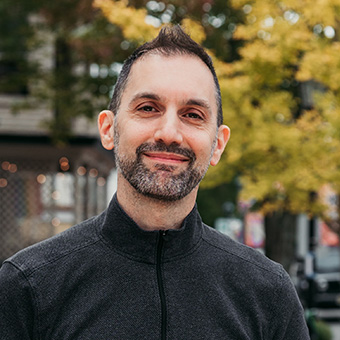
70 Million Jobs
Podcast: Play in new window | Download
As a young boy growing up on Long Island, New York, Richard Bronson was mainly interested in reading and writing. He was even the editor of his high school newspaper. But by the time he got out of college, his biggest interest was in making money and living the high life. These desires led him to rise through the ranks of one of the most infamous investment firms on Wall Street – Stratton Oakmont (as featured in Martin Scorcese’s “The Wolf of Wall Street”). But the good life he created was built on lies, deception and corruption that would not go unpunished. After a two-year stint in prison, Richard chose to turn his life around, and found a new calling – helping other ex-felons find good and honest work.
LINKS:
Full Transcript
Chris Straigis – 0:04
From AAC Studios, welcome to Scrappy, the podcast about small companies doing big things. I’m your host, Chris Straigis.
Chris Straigis – 0:16
Our mission in this podcast is to shine a well deserved light on some amazing people that are doing some amazing things, from local food drives to global environmental cleanups, and everywhere in between will feature the who, what and why have success and failure and try to get a sense of what makes these incredibly inspiring and passionate people tick. One of the greatest gifts we have as humans, one of the strongest tools in our toolbox, is the ability to adapt and change as we go. You know, a dog is just a dog for its whole life. It does its dog thing every day, eats naps, chases the ball barks at the neighbor’s cat and then all the same stuff the next day, and pretty much all the days after.
Chris Straigis – 1:04
But us humans, we evolve. Just within one lifetime we can become many different versions of ourselves. Often, it’s simply the biology. But sometimes, by choice or by situation, we create the change. We intentionally become someone different. We reinvent ourselves. For this, our maiden season, we will meet 10 people who did just that, in some cases because of circumstances beyond their control, and and others, they’re changing themselves, or their communities, or the whole world around them for the better. So without further ado, let’s dive in. This is Richard.
Richard Bronson – 1:44
My name is Richard Bronson. I am the Founder and CEO of 70 Million Jobs. I was born in the Bronx, New York.
Chris Straigis – 1:54
Richard runs an amazing company called 70 Million Jobs. Their focus is to find solid good paying employment for convicted felons who’ve done their time and squared their debt with society. And what was his inspiration for that idea you might ask? Well, Richard himself is a convicted felon. But we’ll get back to that in a bit. Let’s start at the beginning. It was 1954 New York City bustled with post war prosperity. As his family’s import export business was humming along. They moved to the suburbs of Long Island.
Richard Bronson – 2:28
I left the Bronx when I was three years old. And as many many people in New York did. My family moved out to the suburbs of Long Island, and that’s where I was raised. So ever since I was a very young child, I have memories of my father traveling to the Far East, where he would do business he’d be away for weeks and weeks at a time. And so that was the family business important Christmas decorations, trees and lights and ornaments.
Chris Straigis – 3:08
From a young age Richard was interested in journalism among other things, but he had bigger aspirations than that profession could provide for.
Richard Bronson – 3:17
I was the editor of my high school newspaper, and I went to school at Northwestern for their journalism school. So when I got out of school, I worked for a period of time in the field of journalism, but as I say, it was very, very low paying. When I came back to New York, I I had to address the reality that the things I wanted to have and to do took a lot of money. And being a starving writer, no longer made much sense to me. So like so many others, I decided working on Wall Street could bring me all of those things. I know a lot of people but it was not hard to get a to get a job. I started out as a stockbroker. And I worked at a couple of very large investment banking firms, none of which still exist. But I was very good at it. You know, I was always been a good sell a salesman, I did a lot of cold calling. That was what the business was all about. But at a certain point, after three years or so, three or four years, I became very kind of bored with it, and just unfulfilled with that life. And I was planning to leave the business entirely, but I had a friend who I met, just coincidentally. And he had also followed a similar path. And yet he told me that he had begun working at firm on Long Island, where everybody was making an obscene amount of money.
Chris Straigis – 5:07
The company was Stratton Oakmont. Yes, that Stratton Oakmont of “Wolf of Wall Street” fame. The guys portrayed in that movie were to become Richard’s partners, his friends. And while the decision seemed to make sense at the time, it would come to define his life and hurl him down a dark path.
Richard Bronson – 5:26
When I got to Stratton Oakmont It was a huge sales for with hundreds and hundreds of desks and phones, and probably 95% were young men who were on the phone, and they were cold calling and they were pitching clients to buy stock and pitching very, very hard very aggressively.
Chris Straigis – 5:50
Along Richards tour of the company, he noticed a lot of men making calls that were not very experienced, and as he put it, rough around the edges. But they were still making these huge sales and with it huge sums of money. From his prior experience, he was used to buying and selling stocks on the New York Stock Exchange. But this was different.
Richard Bronson – 6:13
They were primarily involved with small penny stocks where the commission’s or the credits that were available when you bought these stocks were just enormous. It was just incredible. Particularly when people would get off the phone having just made a big sale and a big sale could have meant they got off the phone and then they earned for themselves $20,000 or $30,000 on the call.
Chris Straigis – 6:39
Not one to just coast. Richard saw an opportunity.
Richard Bronson – 6:43
And, you know, I was older than most of the people there and more experienced than most of the people there. So, you know, there was an opportunity for me to contribute to the overall culture and the overall approach. In ways you know that others hadn’t been able to contribute, you know, I brought something new to the table there. So in short order, I was elevated to where I eventually became a partner at the firm. And as a partner there, you know, I had certain managerial responsibilities, but I participated in the profits of the firm as well as my own production. And as a result, I made a great deal of money. It was always clear to me that what was going on there had a had a lot of illicit activity. I knew that obviously, but there was just an environment of acceptance. Everybody was doing it. Everybody was making a lot of money and having fun and why shouldn’t I, or so I told myself. I worked there for a while and I became close to, you know, the people who, you know, were the real owners of the firm, Jordan Belfort, for example, who was played by Leonardo DiCaprio, and we were having all this fun. We were also breaking the law on a daily basis. All of us obviously knew that we were doing this it wasn’t something that we were talking about per se as being a legal activity. But we all certainly knew what we were engaged in our sales techniques, our trading that went on behind the scenes, all of this was illicit. We all knew it. What we were doing was wrong and we had a level of guilt and most of us sought to cover that up with drugs to kind of dole the guilt and the shame that we felt down deep down inside, but when you’re making a lot of money, you know, there’s always people who are going to elevate you and think You’re wonderful and want to be around you, and the toys and the women, you know, and the drugs and the trappings and the maitre D’s and all that stuff, you know, creates this sense of value and worth, you know, that it’s kind of not that hard to kind of accept, you know, the good with the bad because the good was, you know, there was so much of it.
Chris Straigis – 9:28
By the early 90s, he decided that there was only one more step up, and that was to run his own firm. So that’s what he decided to do. In 1992. He took his game to Miami, using all the tricks he learned at Stratton Oakmont. He and another partner from New York made a break for the sizzle of South Florida. The tube bought up a Fort Lauderdale brokerage firm called Biltmore securities for just $200,000. Within a couple of years, they were humming along to the tune of $100 million dollars per year in business.
Richard Bronson – 10:01
I left the firm to start my own firm and to do the same thing, but it’d be mine and to work closely with my friends at Stratton Oakmont because they would be opportunities for us to do business together and further our illicit dealings, you know, by working together in concert. I made a great deal of money, lots and lots of money. My life changed dramatically. I had a spectacular house on the beach, next to Eric Clapton’s house, and I opened up a nightclub that was very, very popular on South Beach and I published a magazine and at the same time. I worked very hard to, you know, establish a patina of respectability for myself. So I became I became a philanthropist and I donated a lot of money to a lot of different good causes. That made me feel better and much more respectable to be around people who were not the people I was working with who are equally a bunch of rogues and cheaters like I was.
Chris Straigis – 11:13
At this point, by the mid 90s, he was making millions. Richard worked very hard to establish himself as a legitimate high society powerhouse in South Florida. He even made it onto the board of the Miami opera. But it all came from ill gotten gains, and he knew that, and those stress cracks were starting to appear. As he told me, it wouldn’t last.
Richard Bronson – 11:35
I always knew that eventually, our day of reckoning would come. This couldn’t go on forever. By about 1997, I really had reached the point where I was sick of myself and what I was doing, and I was just very ashamed and miserable and embarrassed by what had become of my life, you know. And people didn’t quite understand how I could have that attitude. But, you know, ultimately, despite my efforts at narcotizing, you know, all of that guilt and self awareness, nonetheless it crept out. And I decided I had to leave the business, because I just couldn’t go on. We made a decision that we wanted to pay everybody back because we both felt, you know, this level of guilt about what we had done. And we thought it was the right thing to do. So prior to being arrested, prior to the the FBI showing up at my door, which they did, he and I created this very large fund. And we essentially had a lawyer administered for us whereby anybody who claimed to have suffered a loss could access this money and be made whole. And that’s what we did. It didn’t make me feel much better. But certainly I know it was the right thing to do. And in a way I wanted to be punished – in a way I had hoped that by being punished, I can find some closure to this and I could start feeling good again about myself, or at least begin to.
Chris Straigis – 13:26
Richard knew what he had done was not only illegal, but morally corrupt as well. He knew that he would have to answer for it. But he also knew that a person could change, that he could change. So he chose this point in his life to begin a turnaround.
Richard Bronson – 13:43
And the judge, you know, who was not a fan of mine, nonetheless, couldn’t ignore the fact that we had done what we had done, which is certainly not typical at all. And what I had done also, prior to that day of sentencing, that day of reckoning, is every penny I had left over and I had millions of dollars left over, after paying everybody back and paying all the fees and penalties. And I took every penny I had and I gave it all away to charity. So I literally had no money left at all when I was being sentenced. And I did that people thought I was crazy for that, but it was the only thing that made me feel good. I pled guilty, and hope for the best. I received a sentence of two years, which under the circumstances could have been a lot worse, and I eventually went away to prison.
Chris Straigis – 14:52
Now, to be fair, he did get off easy. White collar prison with mostly high-value cellmates. But still is incarceration for two years, away from family and away from normalcy, and nothing to do but think about what to do when you get out. And just like the reckoning he faced going in, when it came time to return to his life as a free man, he had to face himself and his choices again, this time, starting over in middle age.
Richard Bronson – 15:23
So I got out, and of course, again, I didn’t have a penny to my name. I didn’t have a home. Luckily, I have a sister who had a couch, and she made that available to me. But other than that, I had nothing at all going for me. You know, prison does teach you to be humble when you’re scrubbing the toilet for 100 men you don’t know. If that doesn’t teach you a little humility, you know, you’re probably just not worth saving. So I really didn’t know, you know, do I get my mojo back? Am I talented or, you know, my success that I had was it only because it was illegal? Could I be successful doing something legally? I was 50 years old. You know, being 50, under any set of circumstances is hard to find a job and to get your life back going. To be 50 with a felony conviction under your belt, a highly publicized one, is really hard to figure out how you fit in and where you fit in and who will have me. I wasted several years knocking around trying to figure things out.
Chris Straigis – 16:33
It was here that fate stepped in and open the gate to a new path.
Richard Bronson – 16:39
I was very lucky because I discovered a nonprofit that works in the reentry space in New York called Defy Ventures. And they teach entrepreneurialism to people in and out of prison as a means to kind of capture gain control of your of your economic future. It was the woman who who founded the organization was incredibly helpful to me. And she encouraged me to be as forthcoming and an open and transparent as I could be about my past. She said, “people will forgive you if they know you’re sincere, you take ownership and you’re being honest about it”. And I discovered that people that I was coming in contact with, were incredibly forgiving, and generous of spirit. And, and, and, you know, helpful. And, you know, it’s just was completely a revelation to me. I had no idea. But I worked in that organization for a year or two and I became a director there so I was helping manage it. But eventually, I felt like this is what I wanted to do with my life. I do want to help people coming out of prison, to have an easier go of it than I had. But I felt like all these nonprofits, despite the fact that they’re all very well meaning, they weren’t really accomplishing all that much. And that a for-profit approach would really shake things up. And it could scale. And particularly if it employed technology could have a much greater impact. So I left the nonprofit gig and I launched 70 Million Jobs in New York. Almost immediately, the city of Los Angeles asked me to partner with them to help them solve their problem with unemployment among people with records. Then I was recruited to go through Y Combinator. Y Combinator for those who are not familiar is a early stage investor in tech companies and it operates the world’s number one accelerator program. They help you all kinds of ways to really get your business off the ground and be very successful companies like Airbnb and Reddit and Stripe and many others went through this program and of course have become multi-billion dollar companies. So I was very, very lucky to get in. I went through the program and was able to raise venture capital money at its conclusion. We have two businesses now, one is a job board for people with records. And we’ve got about 11 million people with records who are involved. We work with some of the largest employers in the country. So we’ve been successful in getting a lot of people jobs. And we’re just now launching a staffing company, also for this population whereby we will be the hirer of record and we’ll have more control over the whole process. And I expect in short order that we will be the largest employer of people with records in the country. Right now companies are desperate to fill positions. And that’s, you know, on top of that retention is a big problem, because young people these days, you know, jump around unemployment constantly, they don’t stay at jobs, typically, you know, they just want to taste everything that’s out there. And that means that companies are really constantly having to hire for the same positions over and over. So it’s created a crisis for them. It’s a real challenge to fill positions, there’s 7 million unfilled jobs in corporate America. Turns out, very counter intuitively perhaps, that this population actually make incredibly good employees, because they know they don’t have many options. And because nobody really has ever looked out for them or cared much about them, when a company does and if even if it’s a reasonably good job, they know that they can’t screw up because if they do what happens next? They may not find another job for eight years. So they end up not only doing well on the job, they end up sticking around longer, and that’s a home run to any HR department.
Chris Straigis – 21:19
It was at this point in my conversation with Richard that something triggered. Once we started talking about socioeconomic and moral realities faced by every person coming out of prison, especially felons. He became more intense, more passionate, more connected to his mission. We were no longer discussing just his life, but the countless lives that have resolved their legal obligations, but must now reconcile with a society that sees him differently.
Richard Bronson 21:48
We’ve all screwed up in our lives. They know that, you know, people have made mistakes when they’re young, should they have to suffer for the rest of their life? It’s not like, you know, there’s a difference between them and us. You know, them is us. One in three adults have a record. Half the families in the United States have someone in the family who has a record. So when you have that many people, you know, who have gone through it, you can’t just dismiss them all as being awful evil, terrible monsters, you know, because them is us. Almost every other person that I’ve come in contact with, they are good people and bad people. They’re just the same as anybody else. And you know, just in certain situations, things just went wrong or they got caught where the other guy didn’t get caught and their life just took a complete different turn for the worse and all they want to do is put it behind them and get back be productive. Nobody wants to return to prison. Those are myths. These are people who will would love nothing more than to work hard, take care of their family, pay taxes and, and lead just a nice productive life. Someone does something that puts them in prison and they’re away for a long time. And then they come out and they haven’t learned the skill, they haven’t learned, haven’t gotten educated beyond a high school diploma or a GED, I should say. And you, and then you say, “all right now go fend for yourself”. And what does that mean? If you’re lucky, you’ll get a job working at McDonald’s part time. You know, in Texas, the minimum wage is $7.25 cents. So for people there, if you’re lucky, you’ll get a job making $150 a week, pre tax. And if you’re married, what path is that out of poverty? What do you expect these people to do? You expect them to live on that? Do you expect them to, you know, they’re going to go back to their behavior, at least they can make money. And that’s what happens. That’s what recidivism is. About to about two thirds of all people are rearrested within three years of they’re released from jail or prison. It’s not because they want to go to prison again. It’s because they want to get food and pay the rent and take care of their family and have a life. And if they can’t get it, or if they don’t have the skills to get it, what the hell do you expect them to do? What would you do?
Richard Bronson – 24:30
I don’t want to go back to prison for sure. But if I had no other means, and particularly if I had a family to take care of, I would do whatever it took. So that’s the reality for people coming out of jail or prison. Again, they’re not evil. It turns out that they make great workers every study shows it, companies are aware of it. That’s why we’re successful because we make these folks available and they’re doing great on the job. Once they have a job, they never get in trouble again. If they don’t have a job, they always get in trouble. We can solve the problem easily by giving people, you know, the training so that they can go out and get a real job and pay taxes and take care of their families and not have to break the law again. So employment is the silver bullet. It’s the answer. That’s what eradicates recidivism. Recidivism costs this country $100 billion dollars a year. It costs us additional victims whose lives are hurt by crimes. Cops get shot and killed arresting people who are being rearrested and we’re getting nothing for it.
Chris Straigis – 25:43
Richard made some very bad choices that ultimately had a negative effect on his life and the lives of many others. But now he’s trying to change the lives of millions of Americans for the better.
Richard Bronson – 25:54
We’re in a race and every day, you know, we know we’re helping people get jobs is a good day for us. We’re very honored to be doing the work that we’re doing.
Chris Straigis – 26:16
Thanks for listening to Scrappy. You can find show notes, images and links from today’s episode at scrappypod.com. If you have an idea for someone who would make a great guest for our show, we’d love to hear from you. Head to scrappypod.com and fill out our form and hopefully we can get them on next season.



